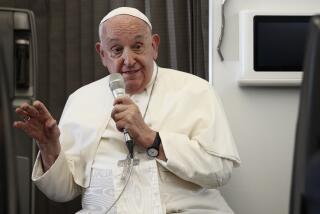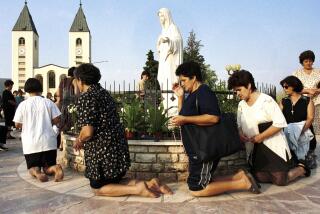Vatican Rules Out Liberalized Liturgy
- Share via
VATICAN CITY — The Vatican issued a series of rules Friday aimed at stopping what it called “habitual abuses” of traditional church practices in the celebration of the Roman Catholic Mass, and the senior prelate responsible for the instructions said politicians who support legalized abortion must be denied Holy Communion.
Cardinal Francis Arinze, a top Vatican official, would not single out U.S. Democratic presidential candidate John F. Kerry by name. But when asked in general terms whether a priest should refuse to give Communion to a Catholic politician who supports abortion rights, as Kerry does, Arinze replied with an emphatic yes.
The exchange occurred during a news conference at the Vatican that was called to unveil a long-awaited document commissioned by Pope John Paul II that orders strict adherence to church norms for celebrating Mass and giving and receiving Communion, the central rites in Catholicism.
The document is meant to reinject a measure of sobriety to liturgical practice and comes in response to what church conservatives see as serious abuses: the growing participation of laypeople in religious ceremonies, the use of unapproved prayer texts and the introduction of non-Catholic elements in the service.
In Washington, Bishop Wilton D. Gregory, president of the U.S. Conference of Catholic Bishops, called the Vatican statement “a carefully developed tool to foster the authentic celebration of the Mass.”
“There is no more important work than the care and attention that we give the sacred liturgy,” Gregory said. “Fidelity to the liturgy, as given to us by the church, is fidelity to Christ.”
The document, 71 pages in English translation, was watered down from an earlier draft that reportedly forbade altar girls, applause, dance and certain music during Masses. Those provisions, leaked to a Catholic magazine last summer, created a furor among priests who want the church to be more inclusive, especially in parts of the world where traditional religion is declining and where the Catholic Church, these clerics believe, must adapt.
Priests in the Assn. of Professors of Liturgy petitioned the pope, expressing “bewilderment, unease, fear and concern” over the tone of the earlier draft, which they felt attempted to undermine the spirit of reform launched by the Second Vatican Council. In the 1960s, the council liberalized many liturgical practices, such as allowing priests to face their congregations during Mass and lead the service in languages other than Latin.
The document released Friday was softer than the draft and largely restates existing rules for Mass and worship at church. It allows girls and women to serve at the altar if a local bishop permits it, although it says using men and boys for the practice is “laudable.”
No mention is made of the clapping and ritual dance that are increasingly common, especially in Third World and U.S. services. But music, it says, must be “true and suitable sacred music.” Only approved Scripture readings are allowed, and they should not be replaced with nonreligious selections, such as poetry.
Laypeople may not distribute Communion or deliver sermons, except in extreme circumstances when priests and deacons are in short supply or indisposed, the document said. Currently in some parishes, the lay faithful and even women take lead roles in the Mass, a development the Vatican is attempting to discourage.
Arinze said the celebration of Mass and sharing of Communion must always demonstrate proper reverence for God.
“You do not go [to Mass] to applaud a maestro or to have camaraderie with the priest,” he said. “We go to adore Christ.”
The document is also firm in reiterating church policy that Communion must not be shared with non-Catholic Christians -- a common practice in some churches seeking to cultivate a spirit of ecumenicalism -- nor can it be administered to a Catholic who knows he or she is in “grave sin” and has not gone to confession to alleviate that sin.
Catholics believe that they are receiving the body and blood of Christ when they receive the Eucharistic wafer and wine at Communion. It is too important a ritual, the Vatican says, to be tampered with or altered by individual priests fulfilling a “personal whim.” “In some places, the perpetration of liturgical abuses has become almost habitual, a fact which obviously cannot be allowed and must cease,” the document says.
Initially, Arinze was asked whether Kerry should be denied Communion, because he supports the right of a woman to choose abortion, which the church views as murder and a mortal sin. Arinze said it was up to U.S. bishops to interpret the rules. “The norm of the church is clear,” he said.
Later, when asked more broadly whether priests should refuse Communion to a politician who holds such views “unambiguously,” he said, “Yes.”
“Objectively,” the cardinal said, “the answer is there.”
Arinze, a Nigerian who is frequently mentioned as a potential candidate to succeed John Paul and become the first black pope, is known for his conservative doctrinal views. He heads the Vatican department that writes the rules for how the holy sacraments should be practiced.
He helped write the document released Friday, titled “The Sacrament of Redemption: On Certain Matters to Be Observed or to Be Avoided Regarding the Most Holy Eucharist.”
“Not infrequently, abuses are rooted in a false understanding of liberty,” the document says. “Yet God has not granted us in Christ an illusory liberty by which we may do what we wish, but a liberty by which we may do that which is fitting and right.
“If the bond ... which the Sacraments have with Christ himself were to be broken ... it would not be beneficial to the faithful but rather would do them grave harm,” the instructions continue. “Anyone [at Mass] who gives free rein to his own inclinations, even if he is a priest, injures the substantial unity of the Roman Rite, which must be vigorously preserved.”
The Vatican edict, Gregory noted, makes no change in existing liturgical law but emphasizes that it must be followed in view of “abuses” that have occurred over the years, including unauthorized Eucharistic prayers and unauthorized people taking part in portions of the Mass reserved for priests.
Times staff writer Larry B. Stammer in Los Angeles contributed to this report.
More to Read
Sign up for Essential California
The most important California stories and recommendations in your inbox every morning.
You may occasionally receive promotional content from the Los Angeles Times.











